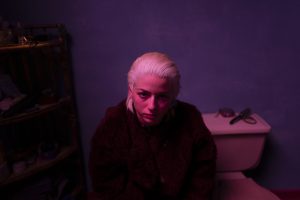The heady combination of fire, dance and sexuality are united themes in Chilean filmmaker Pablo Larraín’s erotic drama Ema (2019). In the first 60 dramatic seconds we hear and then see a suspended traffic light burning in a darkened city street; arcing and crackling as cinders fall to the pavement below. What has happened? A short circuit perhaps? All becomes clear soon enough in spectacular night scenes of street structures and other objects, including a trio of playground swings, being torched as the film progresses — all beautifully captured by cinematographer Sergio Armstrong and set to the electronic beats of Nicolas Jaar.
The flamethrower is free-spirited Ema (Mariana Di Girolamo, in her first lead role), a beguiling and stubborn young dancer and teacher. Her life is in the exuberant music she dances to as part of an experimental modern ensemble overseen by her older husband, demanding choreographer Gastón (Gael García Bernal). The couple is reeling from a crisis: they’ve just returned their adopted 12-year-old son Polo (Christián Suárez) to child services and the agonising decision turns their marriage into chaos, but Ema refuses to let go, setting out on a determined quest to reunite her family.
Dance, however, is the thing that carries the film and Ema/Di Girolamo is its emissary. Her insatiable energy lies in the sensual reggaetón music, a genre that emerged from 1990’s Puerto Rico which synthesised hip-hop and reggae rhythms. Di Girolamo isn’t a professional dancer but she’s done a deal of work and looks as if she is. It’s a remarkable performance but not only in her dance; with her face framed with pasted-back bleached hair she has a way with the camera and vice versa that’s both enigmatic and evocative.
The power of Ema’s fluid sexuality is integral to the story. She has an affair with Aníbal, a fireman, then with Paola his wife — all planned for a reason and explained later — as well as Sonia, a member of the dance troupe. Indeed she has frequent sex revealed in a series of fleeting images, much of which is intense and real, particularly the female to female couplings.
The juxtaposed scenes of Ema dressed in protective gear with back-tanks and flamethrower present staccato moments of flaming, dark beauty — if the wanton destruction of civic property is overlooked. Reality and the idea of any sequential narrative need to be relinquished; this film wants to wash over you from several directions at once.
In these various scenes it’s Ema who’s in control: she leads most of the dance sequences, wields the flamethrower, directs a firehose (in one short shot), and does the seducing. In Ema’s mind, body and hands, dance, fire and love-making are all part of her creative expression and experience. (“Ema is the heart and soul of this movie”, said its director.)
Unlike Bernal’s lead characters in other movies (The Motorcycle Diaries, Amores perros, Y tu mamá también, Babel), director Larraín has him play a different role: that of a slightly sad husband, overridden, a little sullen at times, yet dynamic at others. At one point Gastón gives a strident rave to the dance troupe about the shortcomings of reggaetón, giving cause you might think for a schism that would be hard to breach between him, Ema and the dancers — but that’s not the outcome. In this and other scenes calling for depth and subtlety, Bernal’s experience as an actor shine. We see Gastón as a steady balance, the foil, to Ema’s wildness and anarchy.
The other main character in this story is Chile, particularly the vibrant port city of Valparaíso. While you only see tantalizing glimpses of it in several scenes — particularly the dance segments along the waterfront at dusk — you feel its constant presence.
Ema will not be everyone’s cup of espresso but, as the director says:
“I have no idea what the spectator will take away from the film, because [it] . . . allows for a space . . . through which the spectator can enter and exit . . . For each person, Ema will be a different film.” I found it tough and intoxicating.
Details
Director: Pablo Larraín
Cast: Mariana Di Girolamo (Ema); Gael García Bernal (Gastón); Paola Giannini (Raquel); Santiago Cabrera (Aníbal); Giannina Fruttero (Sonia); Cristián Suárez (Polo)
Run-time: 106 mins; Original language: Spanish; Country: Chile
Reviewed at: Moro 23rd Spanish Film Festival; Palace James Street and Palace Barracks; 20 April to 16 May 2021 https://www.spanishfilmfestival.com/
General release for Ema: NSW, ACT, VIC – 13 May 2021; QLD, SA, WA – 20 May 2021
Images supplied



